2023年中考英语一轮复习 第十二课时 九年级(Unit 1~Unit 4)课件(共68张PPT)
文档属性
| 名称 | 2023年中考英语一轮复习 第十二课时 九年级(Unit 1~Unit 4)课件(共68张PPT) | 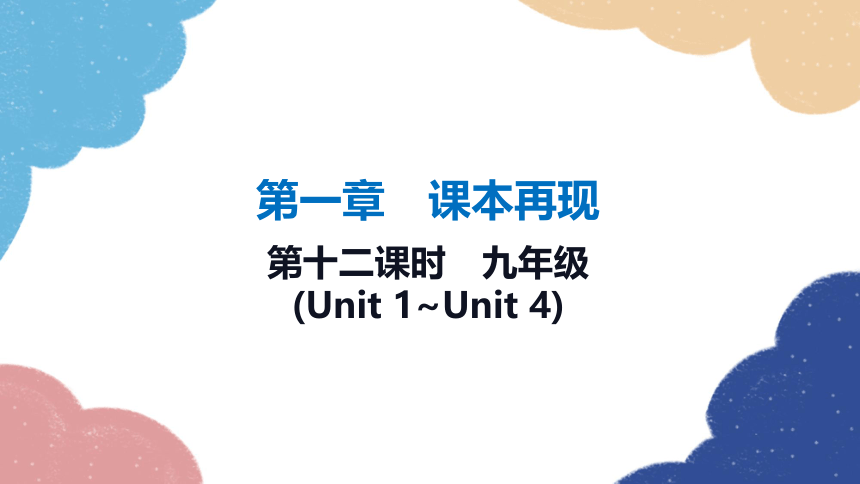 | |
| 格式 | pptx | ||
| 文件大小 | 646.9KB | ||
| 资源类型 | 教案 | ||
| 版本资源 | 人教新目标(Go for it)版 | ||
| 科目 | 英语 | ||
| 更新时间 | 2023-05-23 19:59:26 | ||
图片预览

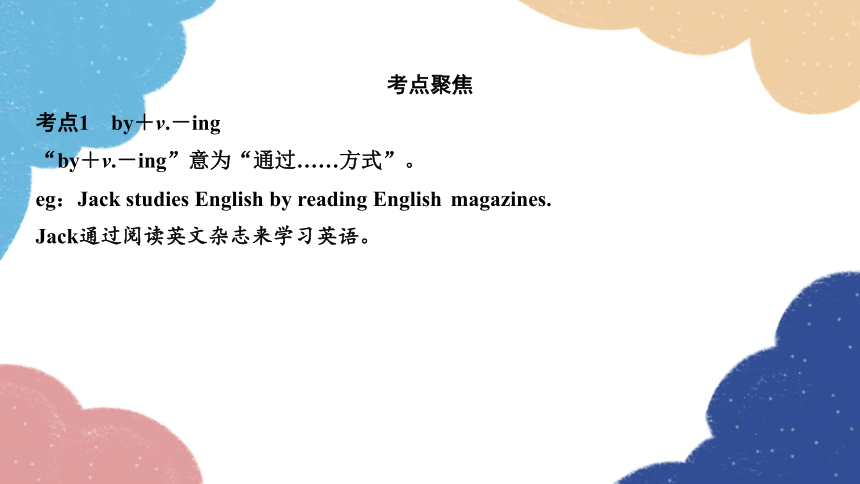




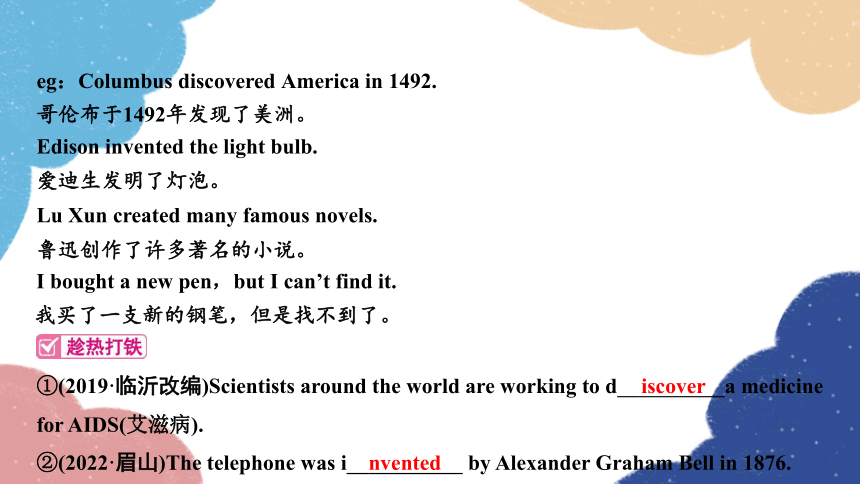
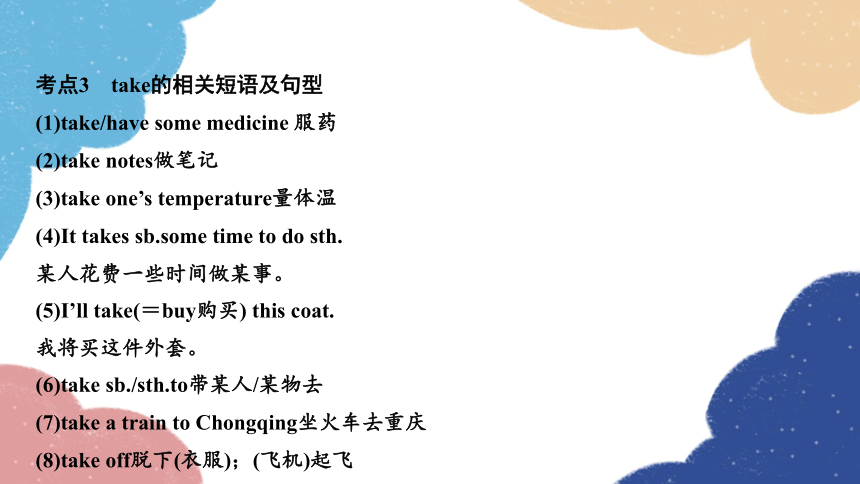
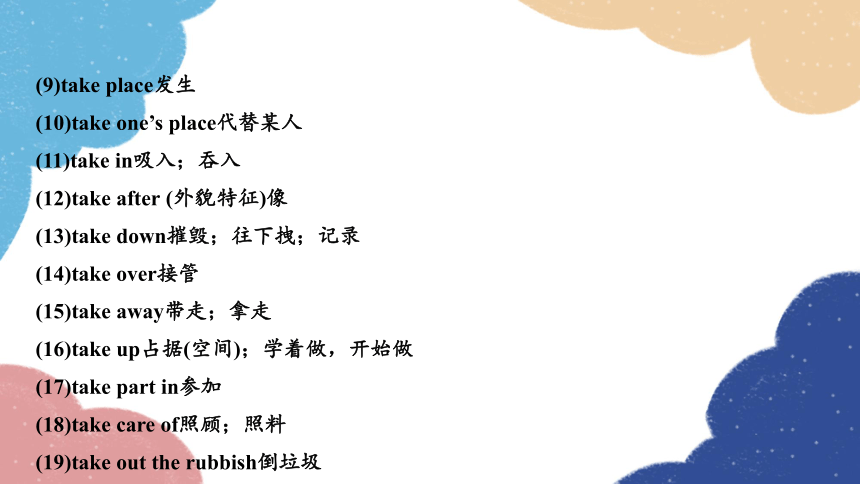
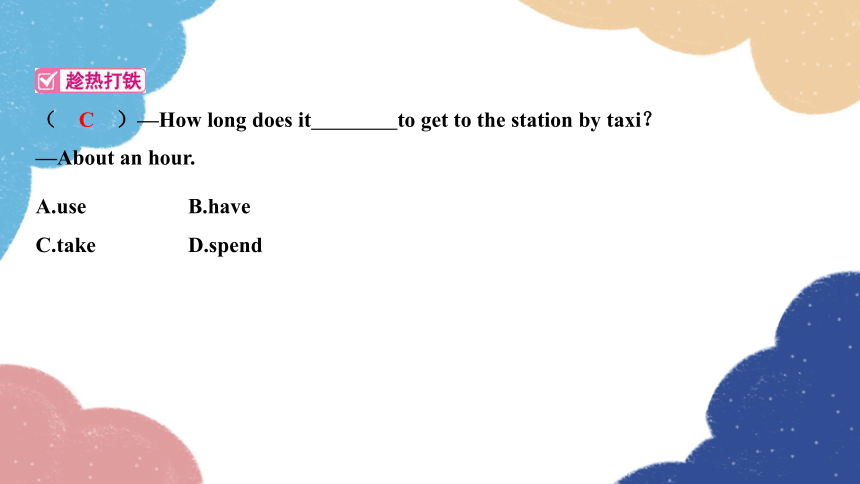

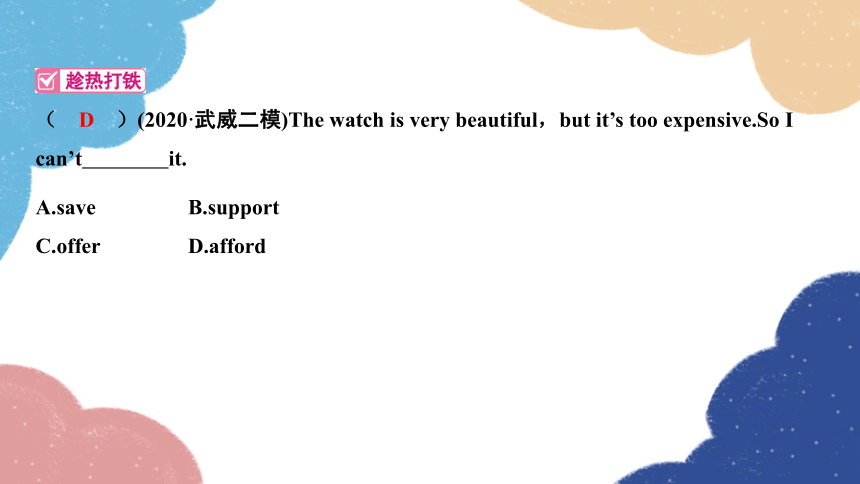
文档简介
(共68张PPT)
第十二课时 九年级
(Unit 1~Unit 4)
第一章 课本再现
考点聚焦
考点1 by+v.-ing
“by+v.-ing”意为“通过……方式”。
eg:Jack studies English by reading English magazines.
Jack通过阅读英文杂志来学习英语。
(1)“with+n.”表示“用某种工具或自身的某个器官”;“in+n.”表示“用某种材料或语言”;“on the+器械/机器”,表示借助或通过器械或机器完成某事。
eg:My father is used to writing with a pen.
我父亲习惯于用钢笔写字。
Can you say it in English?
你可以用英文说它吗?
My sister is talking on the phone.
我姐姐正在讲电话。
(2)by还可以表示“在……旁;在……之前;经过;乘车”等。
eg:I live by the river.我住在河边。
I have to go back by ten o’clock.
10点前我必须回去。
He walked by me without speaking.
他一言不发地从我面前走过。
The student went to the park by bus.
这名学生乘公共汽车去了公园。
( C )(2020·天水)We can overcome all the difficulties by together.
A.work B.works
C.working D.worked
C
考点2 辨析discover,invent,create与find
词条 含义 用法
discover 发现;找到 指通过探险或偶然的机会发现了客观存在的东西,如地点、事物、真理等。
invent 发明 指通过科学手段制造了原本不存在的东西,如设备、装置等。
create 创造;创作 指从无到有创作出原本不存在的东西,如艺术作品、理论等。
find 发现 指偶然发现,或者经过寻找发现某物。
哥伦布于1492年发现了美洲。
Edison invented the light bulb.
爱迪生发明了灯泡。
Lu Xun created many famous novels.
鲁迅创作了许多著名的小说。
I bought a new pen,but I can’t find it.
我买了一支新的钢笔,但是找不到了。
eg:Columbus discovered America in 1492.
①(2019·临沂改编)Scientists around the world are working to d iscover a medicine for AIDS(艾滋病).
②(2022·眉山)The telephone was i nvented by Alexander Graham Bell in 1876.
iscover
nvented
考点3 take的相关短语及句型
(1)take/have some medicine 服药
(2)take notes做笔记
(3)take one’s temperature量体温
(4)It takes sb.some time to do sth.
某人花费一些时间做某事。
(5)I’ll take(=buy购买) this coat.
我将买这件外套。
(6)take sb./sth.to带某人/某物去
(7)take a train to Chongqing坐火车去重庆
(8)take off脱下(衣服);(飞机)起飞
(9)take place发生
(10)take one’s place代替某人
(11)take in吸入;吞入
(12)take after (外貌特征)像
(13)take down摧毁;往下拽;记录
(14)take over接管
(15)take away带走;拿走
(16)take up占据(空间);学着做,开始做
(17)take part in参加
(18)take care of照顾;照料
(19)take out the rubbish倒垃圾
( C )—How long does it to get to the station by taxi?
—About an hour.
A.use B.have
C.take D.spend
C
考点4 afford的用法
(1)afford sth.买得起某物
(2)afford to do sth.负担得起做某事
eg:They did not consider whether they could afford the time or not.
他们没有考虑到他们是否花得起时间。
The mother couldn’t afford to pay for her
child’s education.
这位母亲支付不起她的孩子的学费。
( D )(2020·武威二模)The watch is very beautiful,but it’s too expensive.So I can’t it.
A.save B.support
C.offer D.afford
D
考点5 used的相关短语
词条 含义及用法
be/get/become used to doing sth. 意为“习惯于做某事”,to是介词。用be时强调状态,用get/become时强调动作。
used to do sth. 意为“过去常常做某事”。它的否定形式有两种,即used not to do sth.和didn’t use to do sth.。
be used to do sth./be used for doing sth. 意为“被用于做某事”,用于被动语态中。
eg:He used to walk to school,but now he is used to riding his bike.他过去常常步行上学,但是现在他已经习惯于骑自行车上学。
She used to drink cola,but now she is used to drinking milk.
她过去常喝可乐,但现在她习惯于喝牛奶。
This machine is used to clean the floor.=This machine is used for cleaning the floor.这台机器被用来清扫地板。
be used as 被当作……使用
be used by sb.被某人使用
( B )Mary used to in the countryside,but now she is used to in the city.
A.live;live B.live;living
C.living;live D.living;living
B
考点6 辨析aloud,loud与loudly
三个词都与“大声”或“响亮”有关。
(1)aloud是副词,重点在于出声能让人听见,但声音不一定很大,常用在读书或说话上。通常放在动词之后。aloud没有比较级形式。
eg:He read the story aloud to his son.
他朗读那则故事给他儿子听。
(2)loud可作形容词或副词。用作副词时,常与speak,talk,laugh等动词连用,多用于比较级,须放在动词之后。
eg:She asked us to speak a little louder.
她让我们说大声一点儿。
(3)loudly是副词,与loud同义,有时两者可互换使用,但loudly往往含有“喧闹”或“嘈杂”的意味,可位于动词之前或之后。
eg:He does not talk loudly or laugh loudly in public.
他不当众大声谈笑。
( D )Don’t talk so .
A.more loud B.loud
C.more loudly D.loudly
D
考点7 “Could you please (not) do sth.?”句型
“Could/Would sb.please (not) do sth.?”意为“请某人(不要)做某事,好吗?”,常用来表示请求对方或得到对方允许。该句型肯定回答常用“Sure./Certainly./Of course.”等;否定回答常用“Sorry,I can’t./Sorry,I’m afraid not.”等,一般不用no开头(用no显得语气生硬,不礼貌)。
eg:—Could you please help me with my homework?
你能帮我解决一下家庭作业的问题吗?
—Sure.当然。/Sorry,I can’t.I’m busy now.
抱歉,我不能。我现在在忙。
向别人礼貌地提出请求或许可的其他常见句型:
Can/Will you please...?请你……好吗?
( C )①(2022·达州)—Ruby,could you please help me solve these problems?
— ,but still half are left for you to do by yourself.
A.I don’t think so
B.I hope not
C.With pleasure
D.It’s my pleasure
C
( B )②(2022·自贡)—Mom,could I surf the Internet after finishing my homework?
— .You’d better go out for a walk.
A.Go ahead
B.Sorry,you can’t
C.Of course you can
B
考点8 end的用法
(1)end up doing sth.终止做某事;结束做某事
eg:I ended up finishing all the work myself.
最后所有的活都是我一个人干完的。
(2)end up with sth.以……结束
eg:The party ended up with her singing.
聚会以她的歌唱而告终。
(3)at the end of在……的末尾
(4)in the end最后
(5)by the end of到……结束时
—Where is the nearest post office,sir?
( D )—Go straight and you can find it the street.
A.by the end B.at the end
C.by the end of D.at the end of
D
考点9 辨析deal with与do with
词条 用法
deal with 常与how连用,强调处理问题的方式、方法。
do with 常与what连用,侧重于处理的对象。
eg:I don’t know how they deal with the problem.
我不知道他们如何处理这个问题。
I don’t know what to do with all the food that’s left over.
我不知道怎样处理这些剩饭剩菜。
How did your father deal with the old bike?(改为同义句)
What did your father do with the old bike?
What
do
with
考点10 dare 的用法
( C )(原创)“How dare you back to me?”my mom said angrily.
A.to shout B.shouting
C.shout D.shouted
C
考点11 辨析instead与instead of
(1)instead意为“代替”,用在句末。(字面上常不译出来)
(2)instead of sth./doing sth.意为“代替,而不是”,用在句中,可与rather than do sth.替换。
eg:Last summer I went to Beijing.This year I’m going to Shanghai instead.
去年夏天我去了北京,而今年我打算去上海。
I will go instead of you.我将代替你去。
He stayed at home instead of going swimming.=He stayed at home rather than goswimming.
他待在家里,而不是去游泳。
( B )(2018·曲靖)Imagine you’re Yu Gong,what could you do moving the mountain?
A.in the middle of B.in stead of
C.across from D.up to
B
考点12 辨析pride与proud
词条 词性 含义 用法
pride 名词 自豪(感); 骄傲 take pride in
为……感到自豪、骄傲
be the pride of
是……的骄傲
proud 形容词 自豪的; 骄傲的 be proud of为……骄傲;感到自豪
He was proud of himself for not giving up.=
He took pride in himself for not giving up.
他为自己没有放弃而深感自豪。
eg:I take pride in my work.=I am proud of my work.
我为自己的工作感到自豪。
①(2019·烟台)We are very proud (自豪)that a student from our school has won the first prize.
( C )②(2020·天津)Lang Ping is a symbol of courage and success,and we her.
A.come from B.stand for
C.take pridein D.get ready for
proud
C
考点13 辨析die,dead,dying与death
词条 词性 含义及用法
die 动词 意为“死;死亡;去世”,指因为生病、年老、负伤等原因而死,是非延续性动词,不能和表示一段时间的状语连用。
dead 形容词 意为“死的;无生命的”,表示状态,可以和表示一段时间的状语连用,常用作表语或定语。如果表达“死了多长时间”可以用“have/has been dead+for+时间段”或“died+时间段+ago”。
dying 形容词/现在分词 意为“垂死的;奄奄一息的”,作形容词;die的现在分词,用作定语或表语。
death 名词 意为“死;死亡”,用作主语或宾语。
eg:His grandfather died last week.
他爷爷上周去世了。
His father has been dead for two years.(=His father died two years ago.)他父亲已经去世两年了。(=他父亲两年前去世了。)
This is a dying bird.
这是一只奄奄一息的鸟。
The little match girl froze to death on the cold morning.
卖火柴的小女孩冻死在了寒冷的早晨。
①(2021·淮南东部地区联考)Lucy was really sad because her pet cat was dead (死的).
( C )②(2021·石家庄)Her grandmother in 1985.She for 36 years.
A.died;died
B.dead;died
C.died;has been dead
D.dead;has died
dead
C
考点14 辨析lie与lay
词条 词性 词义 过去式 过去分词 现在分词
lie 动词 躺;位于 lay lain lying
说谎 lied lied lying
lay 动词 放置;下蛋 laid laid laying
lie 名词 谎言
eg:He lay on the beach just now.
刚刚他躺在了沙滩上。
The cinema lies in the north of this city.
这家电影院位于这座城市的北边。
Your watch must be lying.
你的表肯定不准。
Jill cooked and laid out the dishes on the table.
Jill做了饭并且把它们摆放在了桌子上。
The cock never lays eggs.
大公鸡从来不下蛋。
My parents taught me never to tell a lie.
我的父母教导我不能说谎。
口诀记忆
规则是撒谎:lie—lied—lied;
不规则是躺:lie—lay—lain;
躺过就下蛋:lay—laid—laid;
下蛋不规则。
( C )(2019·成都七中期中)Whenever I go to visit my grandparents,they will a lot of delicious food for me.
A.put out B.work out C.lay out
C
重点语法
语法点一 感叹句的结构
What a/an+adj.+可数名词单数+主语+谓语!
How+adj./adv.+主语+谓语!
(2020·菏泽)—He can pick up the table with one hand.
( C )— strong boy he is!
A.How B.What C.What a
C
语法点二 宾语从句
构成规则
引导词 that起连接主从句的作用,一般可以省略。
what,which,who,whose,whom等连接代词在从句中作成分。
when,where,why,how等连接副词在从句中作状语。
宾语从句由一般疑问句变化而来时,连接词用whether或if,意为“是否”。
语序 从句一律用陈述语序,即“主语+谓语”结构。
时态 主句是现在时,从句根据实际情况使用相应时态。
主句是过去时,从句使用过去的某种时态。
时态 从句表示的是客观事实、真理、自然现象等时,不管主句使用什么时态,从句都用一般现在时。
eg:I’m afraid (that) I have made a mistake.
恐怕我犯了一个错误。
I don’t know whatthey are going to do.
我不知道他们打算做什么。
Do you know how they found the place?
你知道他们是怎么找到那个地方的吗?
Could you tell me whether it snows in winter in Australia?
你能告诉我澳大利亚的冬天是否下雪吗?
Do you know where Tomlives?
你知道Tom住在哪儿吗?
I think Joe went to Beijing yesterday.
我认为Joe昨天去北京了。
Kate said she was watching TV thistimeyesterday.
Kate说昨天这个时候她在看电视。
Miss Hu said that theearth goes around thesun.胡老师说地球绕着太阳转。
(1)将含有宾语从句的复合句改为简单句或同义句,用“引导词+to+动词原形”结构,就相当于“疑问词/whether+动词不定式”。
将含有宾语从句的复合句改为简单句的前提条件:
①引导词只能是whether或疑问词。
②宾语从句的主语必须与主句中的主语或宾语是同一个人。
eg:Could you tell me how I can find the library?=Could you tell me how to find the library?你能告诉我怎样找到图书馆吗?
(2)将两个简单句合并为一个含有宾语从句的主从复合句。
①陈述句变宾语从句:
Step 1:that充当引导词。
Step 2:从句照抄在主句之后。
Step 3:句末标点由主句决定。
eg:Jack is a hard-working student.She often tells us.→She often tells us that Jack is a hard-working student.
她经常告诉我们Jack是一名勤奋的学生。
②一般疑问句变宾语从句:
Step 1:if/whether充当引导词。
Step 2:将疑问句变为陈述句(将助动词、be动词及情态动词还原至主语之后)。
Step 3:句末标点由主句决定。
eg:Is there a bank in the neighborhood?Could you please tell me?→Could you please tell me if/whether there is a bank in the neighborhood?
请问你能告诉我在这个社区里是否有一家银行吗?
③特殊疑问句变宾语从句:
Step 1:特殊疑问词充当引导词。
Step 2:将疑问句变为陈述句(将助动词、be动词及情态动词还原至主语之后)。
Step 3:句末标点由主句决定。
eg:When will he leave for Shanghai?I have no idea.→I have no idea when he will leave for Shanghai.
我不知道他什么时候去上海。
在陈述语序的考查中会出现以下易错的考点,即特殊疑问句中的陈述句。
eg:I don’t know what’s the matter with the baby.我不知道这个婴儿怎么了。
I wonder who will teach us English.
我想知道谁会教我们英语。
特殊疑问句中的陈述句:
What’s the matter/trouble/problem(with sb.)?
What’s wrong (with sb.)?
What is happening/happened/will happen/
was happening (to sb.)?
Who helped you?
因为特殊疑问词在从句中作主语,所以这些特殊疑问句被称之为“特殊疑问句中的陈述句”。
(3)宾语从句的否定转移:当主句的主语是第一人称,主句的时态是一般现在时,且谓语动词是think,believe,suppose,imagine等词时,通常“否定形式在主句,而翻译在从句”。
eg:I don’t think she is right.我认为她不对。
( D )(2018·天水)Father’s Day is coming.I’mthinking about .
A.what present I gave him
B.where will we have a big meal
C.if I planned a party for him
D.how I will give him a surprise
D
备考演练
单项选择
( A )1.—How do you study for a test?
— working with friends.
A.By B.With
C.On D.In
( D )2.Ancient people used tablets to write on beforepaper .
A.discovered B.was discovered
C.invented D.was invented
A
D
( B )3.(2022·成都一模)—Dear friend,do you know we can make our dream come true?
—By working together!
A.when B.how C.why
( B )4.It was the man on the bed with his eyes open who the book open on the desk just now.
A.lain;lay B.lying;laid
C.lay;lay D.lying;lied
B
B
( C )5.—There are a few new words in the article.
—What about in your dictionary?
A.looking it up B.looking up it
C.looking the mup D.looking up them
( C )6.Every year a lot of tourists travel to Hainan,because it’s island.
A.so a beautiful B.so beautiful
C.such a beautiful D.a such beautiful
C
C
( C )7.—Have you found the poor dog yet?
—Yes.But he was when we found it.The bad weather killed it.
A.dying B.died C.dead D.death
( D )8.(2022·昭通一模)People around the world can’t imagine in the desert.
A.where can Chinese people plant trees
B.where Chinese people can plant trees
C.how can Chinese people plant trees
D.how Chinese people can plant trees
C
D
( C )9.—Does my question sound enough?
—I don’t think so.You can ask more by using“could”instead of“can”.
A.politely;politely B.politely;polite
C.polite;politely D.polite;polite
( D )10.(2022·抚顺一模)—I’m afraid I can’t come to your birthday party,Jack.
— !But why?
A.What nice news B.How happy
C.How lucky D.What a pity
C
D
感受中考
( C )1.(2022·甘肃)I wonder .
A.that April is the hottest month in Thailand
B.do you know where I can buy some medicine
C.Whether June is a good time to visit Gansu
D.how can I improve my pronunciation
( D )2.(2020·天水)Always tell your parents you are going and you expect to be home.
A.what;where B.when;where
C.where;what D.where;when
C
D
( A )3.(2020·金昌)What pity that you couldn’t go to the party!
A.a B.an C.the D./
( C )4.(2022·武威改编)—Kevin,what are you doing?Don’t you remember that the doctor warns you not to eat any candy?
—I’m so sorry!I totally forgot about that.I’m so used to eating candy every Spring Festival that I didn’t remember this year I wasn’t supposed to. .
A.Practice makes perfect
B.When in Rome,do as the Romans do
C.Old habits die hard
D.Time is money
A
C
( A )5.(2019·兰州)How it rained yesterday!We had to cancel our football match.
A.heavily B.light
C.heavy D.lightly
( B )6.(2021·百色)I used to at half past six,but now I am getting used to at seven.
A.getting up;get up B.getup;getting up
C.got up;getting up D.got up;get up
A
B
( D )7.(2022·黔东南州)An old man on the side of the road was found ,and he was sent to the hospital by the bus driver and passengers immediately.
A.lies;dies B.lay;died
C.lain;dead D.lying;dying
( C )8.(2018·天水) wonderful The Reader is!Many people enjoy the TV program.
A.What B.How a
C.How D.What a
D
C
( B )9.(2020·兰州)—Can you tell me this term?
—On September 21st.
A.when will the school trip be
B.when the school trip will be
C.where will the school trip be
D.where the school trip will be
10.(2021·酒泉)We Chinese are proud
(pride) of the great changes in our country.
11.(2019·兰州一诊)人生而会学习。
Everyone is born with the ability to learn.
B
proud
born
with
中考新题型
一、单项选择
( A )1.(2021·酒泉)—Your hometown is beautiful,and the air is really fresh.
— .
A.Thanks.I’m happy you like it
B.Don’t say that
C.It’s just so-so
D.Don’t mention it
A
( B )2.(2017·庆阳)—How is your second-hand computer?
— ,so good.
A.As long B.So far
C.So much D.As for
( A )3.(原创)Which sound goes with the word“wood”?
A./w d/ B./w d/
C./w dn/ D./w dn/
B
A
( C )4.(原创)What is the sentence pattern(句型) of the sentence “Kitty offered Sandy some advice.”?
A.S+V B.S + V + O
C.S+V+IO+DO D.S+V+O+OC
( A )5.(原创)Which part is the“SUBJECT”of the following sentence“Tim watches TV every weekend.”?
A.“Tim” B.“watches”
C.“TV” D.“ every weekend ”
C
A
( B )6.(2022·天水)Which of the following signs will you probably see in a reading room of a library?
A. B.
C. D .
B
②turn off the gas(煤气) after cooking
③go swimming alone in the river
④take care of your own things when you travel
( B ) 7.(2022·哈尔滨)To keep safe in coming summer vacation you are supposed to .
①refuse to let strangers in
⑤leak(泄露) your personal information on the Internet
A.②③⑤ B.①②④
C.①③⑤
B
( D )8.(2022·镇江)Which of the following words rhymes(押韵) with the last word in the first line of the poem?
Though time flies fast,
Sweet memories will .
A bright future is on the way,
And what a wonderful day!
...
A.remain B.appear
C.taste D.last
D
二、任务型完形填空(2022·甘肃)
用方框中所给单词或短语的适当形式填空,使短文通顺、完整,每个单词或短语限用一次。
can,I,be,five,miss,good,
in,road,wait for,back
“What a great film!”says Dan.
Dan Parks and Sue Barrington are leaving the Odeon cinema in Oxford.
“I love Eddie Redmayne,”says Sue.
“Yes,he’s a 1. good actor,”replies Dan.
He looks at his watch.
“It’s 2. five o’clock already,”he says.“Time to get home.”
good
five
“Yes,”says Sue.“It’s beginning to get dark.”
They walk up the street and look for their bikes.There 3. are a lot of bikes in Oxford.The city is flat and a lot of people cycle.
“There’s my bike,”says Dan.He looks for Sue’s,but he 4. can’t see it.
“Where’s 5. mine ?”asks Sue.“It’s not here.”
Then they see her bike lock on the ground—6. in two bits.
“Oh no!”says Sue.“Bike thieves!”
Dan looks up and down the road.He sees a police car fifty meters away on the other side of the street.
“7. Wait for me,”he says to Sue,and runs across the street.
are
can’t
mine
in
Wait for
She watches him.He talks through the window of the police car and points 8. back at her.
Then a policewoman gets out of the car and comes across the road with Dan.
“Hello,”says the policewoman to Sue.“I’m PC Jennings.Your friend tells me your bike is 9. missing .Now tell me about the bike.”
“Well,it’s blue,”begins Sue.“It’s a 10. road bike.And it’s only a year old.”
Jennings writes everything in her notebook.
...
back
missing
road
三、句子翻译(2022·甘南州)
根据汉语提示,在空格中填上适当的英文单词,每空一词。
1.这些衣服是中国制造的。
These clothes are made in China.
2.事实上,他是一个好拍档。
In fact ,he is a good partner.
3.这孩子太小了,不能独自参加夏令营。
The kid is too young to go to the summer camp alone.
4.所有的这些比赛都有一个共同点。
All these competitions have one thing in common .
made
in
In
fact
too
to
in
common
5.每个人都应该重视健康问题。
Everyone should take the health
problems seriously .
take
seriously
第十二课时 九年级
(Unit 1~Unit 4)
第一章 课本再现
考点聚焦
考点1 by+v.-ing
“by+v.-ing”意为“通过……方式”。
eg:Jack studies English by reading English magazines.
Jack通过阅读英文杂志来学习英语。
(1)“with+n.”表示“用某种工具或自身的某个器官”;“in+n.”表示“用某种材料或语言”;“on the+器械/机器”,表示借助或通过器械或机器完成某事。
eg:My father is used to writing with a pen.
我父亲习惯于用钢笔写字。
Can you say it in English?
你可以用英文说它吗?
My sister is talking on the phone.
我姐姐正在讲电话。
(2)by还可以表示“在……旁;在……之前;经过;乘车”等。
eg:I live by the river.我住在河边。
I have to go back by ten o’clock.
10点前我必须回去。
He walked by me without speaking.
他一言不发地从我面前走过。
The student went to the park by bus.
这名学生乘公共汽车去了公园。
( C )(2020·天水)We can overcome all the difficulties by together.
A.work B.works
C.working D.worked
C
考点2 辨析discover,invent,create与find
词条 含义 用法
discover 发现;找到 指通过探险或偶然的机会发现了客观存在的东西,如地点、事物、真理等。
invent 发明 指通过科学手段制造了原本不存在的东西,如设备、装置等。
create 创造;创作 指从无到有创作出原本不存在的东西,如艺术作品、理论等。
find 发现 指偶然发现,或者经过寻找发现某物。
哥伦布于1492年发现了美洲。
Edison invented the light bulb.
爱迪生发明了灯泡。
Lu Xun created many famous novels.
鲁迅创作了许多著名的小说。
I bought a new pen,but I can’t find it.
我买了一支新的钢笔,但是找不到了。
eg:Columbus discovered America in 1492.
①(2019·临沂改编)Scientists around the world are working to d iscover a medicine for AIDS(艾滋病).
②(2022·眉山)The telephone was i nvented by Alexander Graham Bell in 1876.
iscover
nvented
考点3 take的相关短语及句型
(1)take/have some medicine 服药
(2)take notes做笔记
(3)take one’s temperature量体温
(4)It takes sb.some time to do sth.
某人花费一些时间做某事。
(5)I’ll take(=buy购买) this coat.
我将买这件外套。
(6)take sb./sth.to带某人/某物去
(7)take a train to Chongqing坐火车去重庆
(8)take off脱下(衣服);(飞机)起飞
(9)take place发生
(10)take one’s place代替某人
(11)take in吸入;吞入
(12)take after (外貌特征)像
(13)take down摧毁;往下拽;记录
(14)take over接管
(15)take away带走;拿走
(16)take up占据(空间);学着做,开始做
(17)take part in参加
(18)take care of照顾;照料
(19)take out the rubbish倒垃圾
( C )—How long does it to get to the station by taxi?
—About an hour.
A.use B.have
C.take D.spend
C
考点4 afford的用法
(1)afford sth.买得起某物
(2)afford to do sth.负担得起做某事
eg:They did not consider whether they could afford the time or not.
他们没有考虑到他们是否花得起时间。
The mother couldn’t afford to pay for her
child’s education.
这位母亲支付不起她的孩子的学费。
( D )(2020·武威二模)The watch is very beautiful,but it’s too expensive.So I can’t it.
A.save B.support
C.offer D.afford
D
考点5 used的相关短语
词条 含义及用法
be/get/become used to doing sth. 意为“习惯于做某事”,to是介词。用be时强调状态,用get/become时强调动作。
used to do sth. 意为“过去常常做某事”。它的否定形式有两种,即used not to do sth.和didn’t use to do sth.。
be used to do sth./be used for doing sth. 意为“被用于做某事”,用于被动语态中。
eg:He used to walk to school,but now he is used to riding his bike.他过去常常步行上学,但是现在他已经习惯于骑自行车上学。
She used to drink cola,but now she is used to drinking milk.
她过去常喝可乐,但现在她习惯于喝牛奶。
This machine is used to clean the floor.=This machine is used for cleaning the floor.这台机器被用来清扫地板。
be used as 被当作……使用
be used by sb.被某人使用
( B )Mary used to in the countryside,but now she is used to in the city.
A.live;live B.live;living
C.living;live D.living;living
B
考点6 辨析aloud,loud与loudly
三个词都与“大声”或“响亮”有关。
(1)aloud是副词,重点在于出声能让人听见,但声音不一定很大,常用在读书或说话上。通常放在动词之后。aloud没有比较级形式。
eg:He read the story aloud to his son.
他朗读那则故事给他儿子听。
(2)loud可作形容词或副词。用作副词时,常与speak,talk,laugh等动词连用,多用于比较级,须放在动词之后。
eg:She asked us to speak a little louder.
她让我们说大声一点儿。
(3)loudly是副词,与loud同义,有时两者可互换使用,但loudly往往含有“喧闹”或“嘈杂”的意味,可位于动词之前或之后。
eg:He does not talk loudly or laugh loudly in public.
他不当众大声谈笑。
( D )Don’t talk so .
A.more loud B.loud
C.more loudly D.loudly
D
考点7 “Could you please (not) do sth.?”句型
“Could/Would sb.please (not) do sth.?”意为“请某人(不要)做某事,好吗?”,常用来表示请求对方或得到对方允许。该句型肯定回答常用“Sure./Certainly./Of course.”等;否定回答常用“Sorry,I can’t./Sorry,I’m afraid not.”等,一般不用no开头(用no显得语气生硬,不礼貌)。
eg:—Could you please help me with my homework?
你能帮我解决一下家庭作业的问题吗?
—Sure.当然。/Sorry,I can’t.I’m busy now.
抱歉,我不能。我现在在忙。
向别人礼貌地提出请求或许可的其他常见句型:
Can/Will you please...?请你……好吗?
( C )①(2022·达州)—Ruby,could you please help me solve these problems?
— ,but still half are left for you to do by yourself.
A.I don’t think so
B.I hope not
C.With pleasure
D.It’s my pleasure
C
( B )②(2022·自贡)—Mom,could I surf the Internet after finishing my homework?
— .You’d better go out for a walk.
A.Go ahead
B.Sorry,you can’t
C.Of course you can
B
考点8 end的用法
(1)end up doing sth.终止做某事;结束做某事
eg:I ended up finishing all the work myself.
最后所有的活都是我一个人干完的。
(2)end up with sth.以……结束
eg:The party ended up with her singing.
聚会以她的歌唱而告终。
(3)at the end of在……的末尾
(4)in the end最后
(5)by the end of到……结束时
—Where is the nearest post office,sir?
( D )—Go straight and you can find it the street.
A.by the end B.at the end
C.by the end of D.at the end of
D
考点9 辨析deal with与do with
词条 用法
deal with 常与how连用,强调处理问题的方式、方法。
do with 常与what连用,侧重于处理的对象。
eg:I don’t know how they deal with the problem.
我不知道他们如何处理这个问题。
I don’t know what to do with all the food that’s left over.
我不知道怎样处理这些剩饭剩菜。
How did your father deal with the old bike?(改为同义句)
What did your father do with the old bike?
What
do
with
考点10 dare 的用法
( C )(原创)“How dare you back to me?”my mom said angrily.
A.to shout B.shouting
C.shout D.shouted
C
考点11 辨析instead与instead of
(1)instead意为“代替”,用在句末。(字面上常不译出来)
(2)instead of sth./doing sth.意为“代替,而不是”,用在句中,可与rather than do sth.替换。
eg:Last summer I went to Beijing.This year I’m going to Shanghai instead.
去年夏天我去了北京,而今年我打算去上海。
I will go instead of you.我将代替你去。
He stayed at home instead of going swimming.=He stayed at home rather than goswimming.
他待在家里,而不是去游泳。
( B )(2018·曲靖)Imagine you’re Yu Gong,what could you do moving the mountain?
A.in the middle of B.in stead of
C.across from D.up to
B
考点12 辨析pride与proud
词条 词性 含义 用法
pride 名词 自豪(感); 骄傲 take pride in
为……感到自豪、骄傲
be the pride of
是……的骄傲
proud 形容词 自豪的; 骄傲的 be proud of为……骄傲;感到自豪
He was proud of himself for not giving up.=
He took pride in himself for not giving up.
他为自己没有放弃而深感自豪。
eg:I take pride in my work.=I am proud of my work.
我为自己的工作感到自豪。
①(2019·烟台)We are very proud (自豪)that a student from our school has won the first prize.
( C )②(2020·天津)Lang Ping is a symbol of courage and success,and we her.
A.come from B.stand for
C.take pridein D.get ready for
proud
C
考点13 辨析die,dead,dying与death
词条 词性 含义及用法
die 动词 意为“死;死亡;去世”,指因为生病、年老、负伤等原因而死,是非延续性动词,不能和表示一段时间的状语连用。
dead 形容词 意为“死的;无生命的”,表示状态,可以和表示一段时间的状语连用,常用作表语或定语。如果表达“死了多长时间”可以用“have/has been dead+for+时间段”或“died+时间段+ago”。
dying 形容词/现在分词 意为“垂死的;奄奄一息的”,作形容词;die的现在分词,用作定语或表语。
death 名词 意为“死;死亡”,用作主语或宾语。
eg:His grandfather died last week.
他爷爷上周去世了。
His father has been dead for two years.(=His father died two years ago.)他父亲已经去世两年了。(=他父亲两年前去世了。)
This is a dying bird.
这是一只奄奄一息的鸟。
The little match girl froze to death on the cold morning.
卖火柴的小女孩冻死在了寒冷的早晨。
①(2021·淮南东部地区联考)Lucy was really sad because her pet cat was dead (死的).
( C )②(2021·石家庄)Her grandmother in 1985.She for 36 years.
A.died;died
B.dead;died
C.died;has been dead
D.dead;has died
dead
C
考点14 辨析lie与lay
词条 词性 词义 过去式 过去分词 现在分词
lie 动词 躺;位于 lay lain lying
说谎 lied lied lying
lay 动词 放置;下蛋 laid laid laying
lie 名词 谎言
eg:He lay on the beach just now.
刚刚他躺在了沙滩上。
The cinema lies in the north of this city.
这家电影院位于这座城市的北边。
Your watch must be lying.
你的表肯定不准。
Jill cooked and laid out the dishes on the table.
Jill做了饭并且把它们摆放在了桌子上。
The cock never lays eggs.
大公鸡从来不下蛋。
My parents taught me never to tell a lie.
我的父母教导我不能说谎。
口诀记忆
规则是撒谎:lie—lied—lied;
不规则是躺:lie—lay—lain;
躺过就下蛋:lay—laid—laid;
下蛋不规则。
( C )(2019·成都七中期中)Whenever I go to visit my grandparents,they will a lot of delicious food for me.
A.put out B.work out C.lay out
C
重点语法
语法点一 感叹句的结构
What a/an+adj.+可数名词单数+主语+谓语!
How+adj./adv.+主语+谓语!
(2020·菏泽)—He can pick up the table with one hand.
( C )— strong boy he is!
A.How B.What C.What a
C
语法点二 宾语从句
构成规则
引导词 that起连接主从句的作用,一般可以省略。
what,which,who,whose,whom等连接代词在从句中作成分。
when,where,why,how等连接副词在从句中作状语。
宾语从句由一般疑问句变化而来时,连接词用whether或if,意为“是否”。
语序 从句一律用陈述语序,即“主语+谓语”结构。
时态 主句是现在时,从句根据实际情况使用相应时态。
主句是过去时,从句使用过去的某种时态。
时态 从句表示的是客观事实、真理、自然现象等时,不管主句使用什么时态,从句都用一般现在时。
eg:I’m afraid (that) I have made a mistake.
恐怕我犯了一个错误。
I don’t know whatthey are going to do.
我不知道他们打算做什么。
Do you know how they found the place?
你知道他们是怎么找到那个地方的吗?
Could you tell me whether it snows in winter in Australia?
你能告诉我澳大利亚的冬天是否下雪吗?
Do you know where Tomlives?
你知道Tom住在哪儿吗?
I think Joe went to Beijing yesterday.
我认为Joe昨天去北京了。
Kate said she was watching TV thistimeyesterday.
Kate说昨天这个时候她在看电视。
Miss Hu said that theearth goes around thesun.胡老师说地球绕着太阳转。
(1)将含有宾语从句的复合句改为简单句或同义句,用“引导词+to+动词原形”结构,就相当于“疑问词/whether+动词不定式”。
将含有宾语从句的复合句改为简单句的前提条件:
①引导词只能是whether或疑问词。
②宾语从句的主语必须与主句中的主语或宾语是同一个人。
eg:Could you tell me how I can find the library?=Could you tell me how to find the library?你能告诉我怎样找到图书馆吗?
(2)将两个简单句合并为一个含有宾语从句的主从复合句。
①陈述句变宾语从句:
Step 1:that充当引导词。
Step 2:从句照抄在主句之后。
Step 3:句末标点由主句决定。
eg:Jack is a hard-working student.She often tells us.→She often tells us that Jack is a hard-working student.
她经常告诉我们Jack是一名勤奋的学生。
②一般疑问句变宾语从句:
Step 1:if/whether充当引导词。
Step 2:将疑问句变为陈述句(将助动词、be动词及情态动词还原至主语之后)。
Step 3:句末标点由主句决定。
eg:Is there a bank in the neighborhood?Could you please tell me?→Could you please tell me if/whether there is a bank in the neighborhood?
请问你能告诉我在这个社区里是否有一家银行吗?
③特殊疑问句变宾语从句:
Step 1:特殊疑问词充当引导词。
Step 2:将疑问句变为陈述句(将助动词、be动词及情态动词还原至主语之后)。
Step 3:句末标点由主句决定。
eg:When will he leave for Shanghai?I have no idea.→I have no idea when he will leave for Shanghai.
我不知道他什么时候去上海。
在陈述语序的考查中会出现以下易错的考点,即特殊疑问句中的陈述句。
eg:I don’t know what’s the matter with the baby.我不知道这个婴儿怎么了。
I wonder who will teach us English.
我想知道谁会教我们英语。
特殊疑问句中的陈述句:
What’s the matter/trouble/problem(with sb.)?
What’s wrong (with sb.)?
What is happening/happened/will happen/
was happening (to sb.)?
Who helped you?
因为特殊疑问词在从句中作主语,所以这些特殊疑问句被称之为“特殊疑问句中的陈述句”。
(3)宾语从句的否定转移:当主句的主语是第一人称,主句的时态是一般现在时,且谓语动词是think,believe,suppose,imagine等词时,通常“否定形式在主句,而翻译在从句”。
eg:I don’t think she is right.我认为她不对。
( D )(2018·天水)Father’s Day is coming.I’mthinking about .
A.what present I gave him
B.where will we have a big meal
C.if I planned a party for him
D.how I will give him a surprise
D
备考演练
单项选择
( A )1.—How do you study for a test?
— working with friends.
A.By B.With
C.On D.In
( D )2.Ancient people used tablets to write on beforepaper .
A.discovered B.was discovered
C.invented D.was invented
A
D
( B )3.(2022·成都一模)—Dear friend,do you know we can make our dream come true?
—By working together!
A.when B.how C.why
( B )4.It was the man on the bed with his eyes open who the book open on the desk just now.
A.lain;lay B.lying;laid
C.lay;lay D.lying;lied
B
B
( C )5.—There are a few new words in the article.
—What about in your dictionary?
A.looking it up B.looking up it
C.looking the mup D.looking up them
( C )6.Every year a lot of tourists travel to Hainan,because it’s island.
A.so a beautiful B.so beautiful
C.such a beautiful D.a such beautiful
C
C
( C )7.—Have you found the poor dog yet?
—Yes.But he was when we found it.The bad weather killed it.
A.dying B.died C.dead D.death
( D )8.(2022·昭通一模)People around the world can’t imagine in the desert.
A.where can Chinese people plant trees
B.where Chinese people can plant trees
C.how can Chinese people plant trees
D.how Chinese people can plant trees
C
D
( C )9.—Does my question sound enough?
—I don’t think so.You can ask more by using“could”instead of“can”.
A.politely;politely B.politely;polite
C.polite;politely D.polite;polite
( D )10.(2022·抚顺一模)—I’m afraid I can’t come to your birthday party,Jack.
— !But why?
A.What nice news B.How happy
C.How lucky D.What a pity
C
D
感受中考
( C )1.(2022·甘肃)I wonder .
A.that April is the hottest month in Thailand
B.do you know where I can buy some medicine
C.Whether June is a good time to visit Gansu
D.how can I improve my pronunciation
( D )2.(2020·天水)Always tell your parents you are going and you expect to be home.
A.what;where B.when;where
C.where;what D.where;when
C
D
( A )3.(2020·金昌)What pity that you couldn’t go to the party!
A.a B.an C.the D./
( C )4.(2022·武威改编)—Kevin,what are you doing?Don’t you remember that the doctor warns you not to eat any candy?
—I’m so sorry!I totally forgot about that.I’m so used to eating candy every Spring Festival that I didn’t remember this year I wasn’t supposed to. .
A.Practice makes perfect
B.When in Rome,do as the Romans do
C.Old habits die hard
D.Time is money
A
C
( A )5.(2019·兰州)How it rained yesterday!We had to cancel our football match.
A.heavily B.light
C.heavy D.lightly
( B )6.(2021·百色)I used to at half past six,but now I am getting used to at seven.
A.getting up;get up B.getup;getting up
C.got up;getting up D.got up;get up
A
B
( D )7.(2022·黔东南州)An old man on the side of the road was found ,and he was sent to the hospital by the bus driver and passengers immediately.
A.lies;dies B.lay;died
C.lain;dead D.lying;dying
( C )8.(2018·天水) wonderful The Reader is!Many people enjoy the TV program.
A.What B.How a
C.How D.What a
D
C
( B )9.(2020·兰州)—Can you tell me this term?
—On September 21st.
A.when will the school trip be
B.when the school trip will be
C.where will the school trip be
D.where the school trip will be
10.(2021·酒泉)We Chinese are proud
(pride) of the great changes in our country.
11.(2019·兰州一诊)人生而会学习。
Everyone is born with the ability to learn.
B
proud
born
with
中考新题型
一、单项选择
( A )1.(2021·酒泉)—Your hometown is beautiful,and the air is really fresh.
— .
A.Thanks.I’m happy you like it
B.Don’t say that
C.It’s just so-so
D.Don’t mention it
A
( B )2.(2017·庆阳)—How is your second-hand computer?
— ,so good.
A.As long B.So far
C.So much D.As for
( A )3.(原创)Which sound goes with the word“wood”?
A./w d/ B./w d/
C./w dn/ D./w dn/
B
A
( C )4.(原创)What is the sentence pattern(句型) of the sentence “Kitty offered Sandy some advice.”?
A.S+V B.S + V + O
C.S+V+IO+DO D.S+V+O+OC
( A )5.(原创)Which part is the“SUBJECT”of the following sentence“Tim watches TV every weekend.”?
A.“Tim” B.“watches”
C.“TV” D.“ every weekend ”
C
A
( B )6.(2022·天水)Which of the following signs will you probably see in a reading room of a library?
A. B.
C. D .
B
②turn off the gas(煤气) after cooking
③go swimming alone in the river
④take care of your own things when you travel
( B ) 7.(2022·哈尔滨)To keep safe in coming summer vacation you are supposed to .
①refuse to let strangers in
⑤leak(泄露) your personal information on the Internet
A.②③⑤ B.①②④
C.①③⑤
B
( D )8.(2022·镇江)Which of the following words rhymes(押韵) with the last word in the first line of the poem?
Though time flies fast,
Sweet memories will .
A bright future is on the way,
And what a wonderful day!
...
A.remain B.appear
C.taste D.last
D
二、任务型完形填空(2022·甘肃)
用方框中所给单词或短语的适当形式填空,使短文通顺、完整,每个单词或短语限用一次。
can,I,be,five,miss,good,
in,road,wait for,back
“What a great film!”says Dan.
Dan Parks and Sue Barrington are leaving the Odeon cinema in Oxford.
“I love Eddie Redmayne,”says Sue.
“Yes,he’s a 1. good actor,”replies Dan.
He looks at his watch.
“It’s 2. five o’clock already,”he says.“Time to get home.”
good
five
“Yes,”says Sue.“It’s beginning to get dark.”
They walk up the street and look for their bikes.There 3. are a lot of bikes in Oxford.The city is flat and a lot of people cycle.
“There’s my bike,”says Dan.He looks for Sue’s,but he 4. can’t see it.
“Where’s 5. mine ?”asks Sue.“It’s not here.”
Then they see her bike lock on the ground—6. in two bits.
“Oh no!”says Sue.“Bike thieves!”
Dan looks up and down the road.He sees a police car fifty meters away on the other side of the street.
“7. Wait for me,”he says to Sue,and runs across the street.
are
can’t
mine
in
Wait for
She watches him.He talks through the window of the police car and points 8. back at her.
Then a policewoman gets out of the car and comes across the road with Dan.
“Hello,”says the policewoman to Sue.“I’m PC Jennings.Your friend tells me your bike is 9. missing .Now tell me about the bike.”
“Well,it’s blue,”begins Sue.“It’s a 10. road bike.And it’s only a year old.”
Jennings writes everything in her notebook.
...
back
missing
road
三、句子翻译(2022·甘南州)
根据汉语提示,在空格中填上适当的英文单词,每空一词。
1.这些衣服是中国制造的。
These clothes are made in China.
2.事实上,他是一个好拍档。
In fact ,he is a good partner.
3.这孩子太小了,不能独自参加夏令营。
The kid is too young to go to the summer camp alone.
4.所有的这些比赛都有一个共同点。
All these competitions have one thing in common .
made
in
In
fact
too
to
in
common
5.每个人都应该重视健康问题。
Everyone should take the health
problems seriously .
take
seriously
